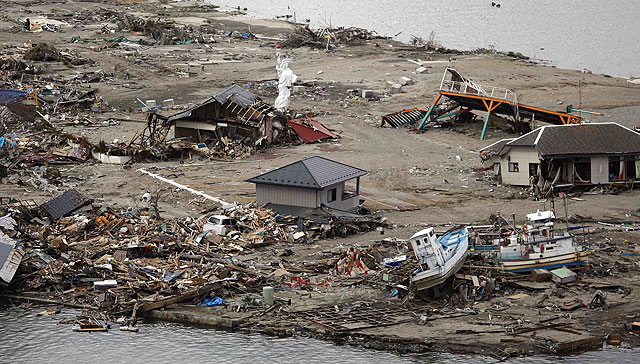The company TEPCO has reported that in marine waters near the Fukushima nuclear plant has found a level of radioactive iodine 7.5 million times the legal limit (a first analysis aimed at 5 million), while cesium- 137 exceeds the 1.1 million times. A sample taken early on Monday 4 April in a sea area near the reactor 2 Fukushima revealed a concentration of iodine-131, 200 000 becquerels per cubic centimeter.
The analysis also showed the presence of cesium-137 that exceeded the legal limit at 1.1 million times, according to sources cited by TEPCO public broadcaster NHK. While iodine-131 has a relatively short half-life of eight days, the half-life of cesium-137 is 30 years. The results of these tests come hours after the company announced the release of 11,500 tons of polluted water into the sea.
The objective is to evacuate the water with relatively low levels of radiation (from units 5 and 6 of the plant) to the ocean to make room and plant containers can hold more contaminated water flooded Units 1, 2 and 3. The state of the reactor and pools is unfortunate, as shown in the footage released by Japanese agencies.
TEPCO has reported that so far has spilled into the Pacific some 3,430 tons of contaminated water, the expected total volume of 11,500 tons. Officials estimate that already have accumulated in the basement of the plant and underground channels 60,000 tons of radioactive water, whose presence hinders the work of technicians to stabilize the plant, severely damaged by the earthquake and tsunami of 11 March.
Japan government spokesman Yukio Dwarf is back to defend this action, which began on Monday, arguing that this measure is necessary to avoid greater evils. Once drained, the more radioactive water will be stored in tanks and reservoirs for nuclear waste in the plant itself, in addition to U.S.
ships and a floating platform to be carried Fukushima later this month, according to local agency Kyodo. The Japanese Minister of Agriculture and Fisheries, Michihiko Kano, has ensured that tighten controls on marine products in the area of Fukushima and neighboring provinces to the continuous leakage of radioactive water into the sea.
Inspections will be reinforced in the region of Ibaraki and also on the coast near the city of Choshi in Chiba province east of Tokyo, said the minister was quoted by Kyodo. In its eagerness to reassure the public, the Japanese government decided on Tuesday, also set a limit of radioactivity in the products from the sea.
"We will apply provisionally set rates for vegetables, fish and seafood," said Japan's government spokesman, Yukio Edan. The limit has been set at 2,000 becquerels / kg for iodine-131, which can cause cancer, and over 500 becquerels / kg for cesium-137. The fish have been found unfit for consumption.
The decision was taken following the discovery in recent days, abnormally high levels of radioactivity in the small sand eels caught off Ibaraki prefecture, south of Fukushima, north of Tokyo. The rest of the analyzed fish showed no elevated levels of radioactivity, the authorities have specified. 


The analysis also showed the presence of cesium-137 that exceeded the legal limit at 1.1 million times, according to sources cited by TEPCO public broadcaster NHK. While iodine-131 has a relatively short half-life of eight days, the half-life of cesium-137 is 30 years. The results of these tests come hours after the company announced the release of 11,500 tons of polluted water into the sea.
The objective is to evacuate the water with relatively low levels of radiation (from units 5 and 6 of the plant) to the ocean to make room and plant containers can hold more contaminated water flooded Units 1, 2 and 3. The state of the reactor and pools is unfortunate, as shown in the footage released by Japanese agencies.
TEPCO has reported that so far has spilled into the Pacific some 3,430 tons of contaminated water, the expected total volume of 11,500 tons. Officials estimate that already have accumulated in the basement of the plant and underground channels 60,000 tons of radioactive water, whose presence hinders the work of technicians to stabilize the plant, severely damaged by the earthquake and tsunami of 11 March.
Japan government spokesman Yukio Dwarf is back to defend this action, which began on Monday, arguing that this measure is necessary to avoid greater evils. Once drained, the more radioactive water will be stored in tanks and reservoirs for nuclear waste in the plant itself, in addition to U.S.
ships and a floating platform to be carried Fukushima later this month, according to local agency Kyodo. The Japanese Minister of Agriculture and Fisheries, Michihiko Kano, has ensured that tighten controls on marine products in the area of Fukushima and neighboring provinces to the continuous leakage of radioactive water into the sea.
Inspections will be reinforced in the region of Ibaraki and also on the coast near the city of Choshi in Chiba province east of Tokyo, said the minister was quoted by Kyodo. In its eagerness to reassure the public, the Japanese government decided on Tuesday, also set a limit of radioactivity in the products from the sea.
"We will apply provisionally set rates for vegetables, fish and seafood," said Japan's government spokesman, Yukio Edan. The limit has been set at 2,000 becquerels / kg for iodine-131, which can cause cancer, and over 500 becquerels / kg for cesium-137. The fish have been found unfit for consumption.
The decision was taken following the discovery in recent days, abnormally high levels of radioactivity in the small sand eels caught off Ibaraki prefecture, south of Fukushima, north of Tokyo. The rest of the analyzed fish showed no elevated levels of radioactivity, the authorities have specified.



No comments:
Post a Comment